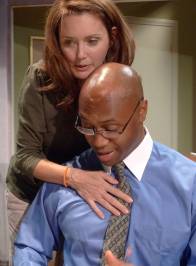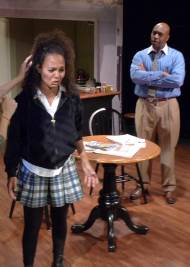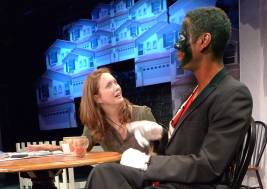
How would you feel if your worst nightmare—the family from hell—moved into the house next door to yours? This is precisely the dilemma faced by African American adjunct college professor Richard Patterson when the Crows take possession of the suburban tract home across the street from his in Neighbors, Branden Jacobs-Jenkins’ provocative though imperfect new comedy-drama now playing at the Matrix Theatre.
On the surface, Richard would appear to be the perfect example of a “post-racist” America—university educated, a respected professor of Greek classics, happily married to a wife who “just happens to be white,” and father to a fifteen-year-old daughter for whom race means far less than her unfounded teenage certainty that she is “fat.”
Then the Crows arrive—Mammy, Zip, Sambo, Jim, and Topsy—a family of black minstrel entertainers who look, dress, and act their racially stereotypical roles even when not on stage, and that means blackface makeup, costumes, mangled English, and all.
Suddenly, Richard’s perfect suburban world crashes in. What will the other neighbors, his friends, and his colleagues say? Will they now start seeing him as—God forbid—black? Will their carefully submerged racism rise to the surface and destroy the life and livelihood Richard has worked so hard to build?
As Jacobs-Jenkins’ deliberately incendiary yet often hilarious play continues its three-hour path towards Richard’s emotional breakdown, and that of his family, Neighbors asks its audience to examine their own attitudes towards race. Is it all right in the year 2010 to laugh at the minstrel skits we see enacted by each of the Crows, skits that our politically correct society tells us are verboten? Shouldn’t we look away in disapproval when two of the male Crows pull out penises and testicles in two sizes, large and elephant-trunk humungous (deliberately fake-looking prosthetics, by the way), or when Mammy uses her pendulous (and equally prosthetic) breasts to put out a fire?
Interestingly, one of the least prejudiced character in Neighbors turns out to be Jean, Richard’s Caucasian wife, a woman who truly appears to have married Richard because he’s Richard, and not because she “had a thing” for black men. Jean is the one who has no problem welcoming the Crows to the neighborhood, and it is Jean who bonds almost immediately with Zip, the sensitive gay member of the Crow family. (I’m not sure what black stereotype Jacobs-Jenkins intends Zip to represent, or that of Mammy’s good-as-gold teenage son Jim.) Richard, on the other hand, does have a problem with the N***ers next door (his word, not Jean’s or mine), goes ballistic at the thought that his daughter Melody may have the hots for Jim, and begins to show signs that unlike Jean, his marriage to a white woman may perhaps have been as much racially motivated as it was by romance.
Before long, things have spiraled out of control in Richard’s life, leading to the play’s shift from comedic to starkly dramatic, even Greekly tragic—and a chance for a number of the superb actors assembled at the Matrix to prove themselves as adept at drama as they are at comedy.
Since Jacobs-Jenkins’ aim is clearly not to perpetuate racial stereotypes, only the most politically correct (… or sensitive … or humorless) are likely to express outrage at Mammy’s Gone With The Wind bandana, Sambo’s inner city thug gear, Topsy’s beribboned nappy hair, or the ubiquitous presence of watermelon imagery throughout Neighbor’s three-hour running time. (Note that evening performances begin a half hour earlier than usual, at 7:30, so as to end at 10:30 and not 11:00.)
What works best in Neighbors (at least at the Matrix) are the performances of its all-around splendid cast, directed with savvy and flair by Nataki Garrett.
As Richard and Jean, Derek Webster and Julia Campbell lay bare the disintegration of a marriage, from sitcom bliss to Who’s Afraid Of Virginia Woolf rage. Jacobs-Jenkins’ gives them the kind of terrific emotional meltdown scenes that actors are dying (or would kill) to play, and both Webster and Campbell are out-and-out superb. Some of Campbell’s best scenes, though, are opposite the wonderful Leith Burke as Zip, scenes in which the actress reveals the ache in Jean’s heart at having given up her identity as an educated, talented woman in order to become the perfect Stepford wife, Burke/Zip lending her the first ear to ever really hear Jean in years.
Equally changed by the arrival of the Crows is Richard and Jean’s daughter Melody (a sensational Rachae Thomas in a night-and-day transformation from her glorious Sarah in last year’s Ragtime), who soon transitions from tantrum-prone teen to an incandescent Juliet in the presence of neighbor Jim Crow’s Romeo. James Edward Shippy simply couldn’t be better, or more adorable, as Marilyn Munster-misfit Jim, whose desire not to inherit his recently deceased father’s role in the family’s minstrel skits doesn’t sit well with Mammy and the rest. Thomas’ and Shippy’s scenes together positively glisten with the joy of first love.
As the three Crows who represent the play’s most potentially offensive stereotypes, Baadja-Lyne (Mammy), Keith Arthur Bolden (Sambo), and Daniele Watts (Topsy) deserve major kudos for going to the extremes that Jacobs-Jenkins’ script demands of them, and doing so with talent and good humor in abundance. Watts in particular is a saucy delight as Topsy, executing Ayana Cahrr’s choreography with pizzazz and proving herself yet another USC School Of Theater grad to watch out for.
Still, despite the hard work of its director and cast, Neighbors does have its flaws, the main one being its length. Unlike August Osage County, which actually requires three-plus hours to tell all its stories, or Who’s Afraid Of Virginia Woolf, which fills its three hour-long acts with Edward Albee’s brilliant dialog, Neighbors runs at least a half hour longer than it needs to. Also, by focusing almost entirely on black-on-black racism, and making its sole white character pretty much the model of colorblindness, Neighbors misses its chance to comment on America’s very real—and primarily interracial—race relation problems. In addition, the abrupt, unsatisfying (and some will say pretentious) way Jacobs-Jenkins’ ends Neighbors seems the act of a writer who’s dug himself a hole and doesn’t know how to get out of it. Finally, any playwright who denies his actors a chance to take their bows and the audience a chance to applaud their performances earns thumbs down from this actor/audience member.
Fortunately, in addition to its accomplished cast, Neighbors at the Matrix benefits from some of the best designers Los Angeles theater has to offer, beginning with John Iacovelli’s imaginative set, which places identical twin tract homes on either side of the wide Matrix stage, joining them with a collage of matching three-dimensional cookie-cutter houses attached to the black brick upstage wall. J. Kent Inasy’s lighting design focuses our attention, all the while enhancing Neighbors’ comedic and dramatic moods. Costume designer Naila Alladin Sanders has gone to town creating the Crow family outfits in Technicolor hues with watermelons showing up just about everywhere. John Zalewski’s sound design incorporates effectively chosen sound effects and old 78rmp recordings of classic vaudeville melodies. Kudos go also to Chuck Olsen’s props, Sandy Huse’s special effects, and Steve Rankin’s exciting, realistically choreographed fights. Joe Morrissey is stage manager.
Whatever its flaws as a play, Neighbors is nothing if not thought-(and conversation)-provoking. If ever there was a play made for talkback performances, Neighbors is that play. At the very least, post-performance Q&As would give audiences a chance to cheer its phenomenal cast.
The Matrix Theatre, 7657 Melrose Ave., Los Angeles.
www.plays411.com/neighbors
–Steven Stanley
September 4, 2010
Photos: I.C. Rapoport





 Since 2007, Steven Stanley's StageSceneLA.com has spotlighted the best in Southern California theater via reviews, interviews, and its annual StageSceneLA Scenies.
Since 2007, Steven Stanley's StageSceneLA.com has spotlighted the best in Southern California theater via reviews, interviews, and its annual StageSceneLA Scenies.







 COPYRIGHT 2024 STEVEN STANLEY :: DESIGN BY
COPYRIGHT 2024 STEVEN STANLEY :: DESIGN BY